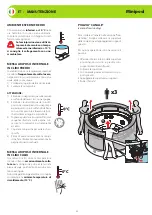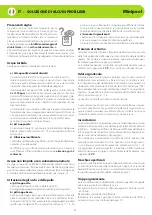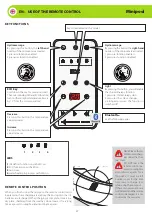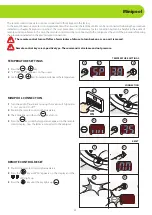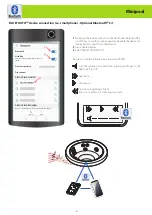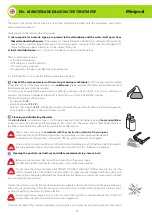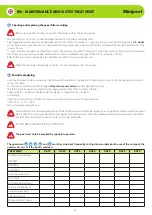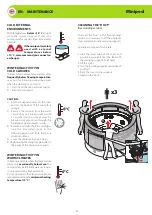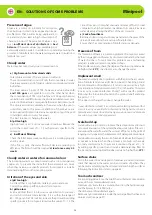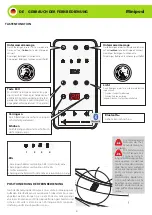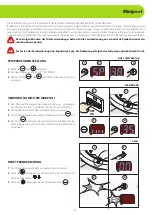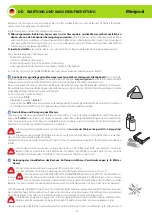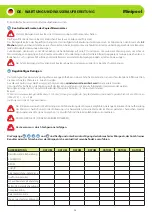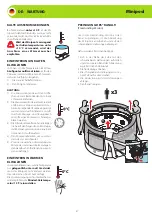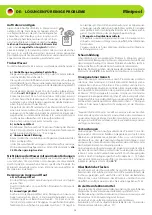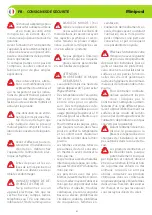
46
Minipool
case of low pH is somewhat unusual and more difficult to treat
compared to a high pH level as, in addition to its value, it involves
water alkalinity altering the effect of the pH corrector.
c) Lack of sanitizers
Bacteria and micro-organisms may penetrate in the pores of the
skin and cause skin rashes and superficial infections.
Ensure that the concentration of disinfectants is adequate.
Presence of foam
The formation of foam is a common problem of minipools, caused
by the strong agitation of water, by dissolved solids and by the level
of water hardness. To overcome this problem, use anti-foaming
products, readily available in specialized shops.
If the problem persists, check the degree of hardness (optimal value
no higher than
25°f
). In extreme cases, change the water.
Unpleasant smell
The smell is normally due to problems with the pH or the accumula-
tion of disinfectant (above all if chlorine-based). Check the pH and
the concentration of disinfectant. It can also be caused by a high
concentration of total dissolved solids (TDS) in the water. To correct
it, carry out a super-disinfection (shock)* with a specific product
(following the instructions found on the product label) and bring
the pH to 7 - 7.2.
If this does not change the odour, change the water.
*super-disinfection (shock): it is an intensive disinfecting treatment that
consists in using a quantity of disinfectant slightly higher than the one
normally used, in order to oxidize the organic substances and eliminate
any micro-organisms and algae present.
Scale build-up
Scale build-up is a common problem. These deposits may obstruct
or cover various parts of the system (heating units, tubes, filter, etc. )
and reduce the water flow and the system’s efficiency to the point of
requiring costly repairs or the replacement of damaged components.
Scale build-up is usually the result of dissolved calcium that deposits
as calcium carbonate when the pH level is too high or there are
too many dissolved salts. To prevent it, maintain the pH at 7 - 7.2
by adding specific products and install a demineralizing filter on
the incoming water (optimal hardness value no higher than
25°f
).
Surface stains
Dirt in the water line and deposit of residues are due to dissolved
solids that deposit in the water or oils and creams of bathers. They
can be removed emptying the minipool and washing the surfaces
following the instructions listed on page 43.
Too much sanitizer
It may be dangerous to use the tub if the disinfectant concentration
exceeds the recommended amounts.
To reduce it, activate the re-circulation function, the hydromassage
and the blower for 15-30 minutes.
Check the level of disinfectant again.
Remove any bromine tablets inside the cartridge filter that have not
dissolved yet (see page 97).
Presence of algae
Algae are a common problem for minipools;
they build up in small scales appearing like pa-
per filaments that, besides being unpleasant to
see and touch, can lead to high consumption of
chemical products. The presence of algae is due
to an
insufficient dose of disinfectant
or
bad
balance
of the water values (e.g. unstable pH or
excessively alkaline water). In addition to constantly ensuring the
presence of disinfectant in the water, adequate water circulation is
important as well.
Cloudy water
Water may become cloudy due to several reasons:
a)
High amounts of dissolved solids
Total dissolved solids (TDS) are present in all tanks.
These dissolved solids consist of salts that concentrate in water
due to evaporation, and of organic substances introduced mostly
by bathers.
The ideal value is 0 ppm of TDS, however, a value between
0
and 1500 ppm
is acceptable too. On the other hand, when
the concentration of TDS is too high (over 1500 ppm), chemical
sanitation is more difficult since the dissolved substances act as a
protection for bacteria: consequently the water becomes cloudy.
The dissolved solids accumulate in the water, when the pool is
used often, due to the excessive addition of chemicals over a
certain period of time or to excessive evaporation (e.g. if the pool
is installed outdoors in very hot areas).
The best solution is changing the water.
b) pH too high
High pH level, over 7.2, can cause water cloudiness. Reduce the
pH to the correct level of 7 - 7.2 with products specific to the
minipool.
c)
Insufficient filtering
Check the filter every week, making sure it is working properly
and it is clean.
If the filter is dirty, the water flow will decrease reducing its
efficiency. The filter should be cleaned
at least once every 2-3
weeks
.
Cloudy water or water of an unusual colour
The incoming water may contain metals such as iron, manganese,
copper, etc. To prevent the stains that these elements can cause
when they oxidise, use specific products for minipools or install a
demineralising filter on the incoming water.
Irritation of the eyes and skin
a) pH too high
A pH level that is too high may irritate your skin and eyes.
Correct by adding specific products for minipools.
b) pH too low
Even a pH level that is too low can cause irritation to your eyes
and skin. First check total alkalinity: if it is within the range of
80 - 120 ppm of CaC03 (calcite), increase the pH level by adding
specific products for minipools to restore the value of 7 - 7.2. The
En
- SOLUTIOnS Of SOME PrOBLEMS


